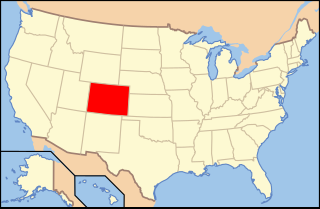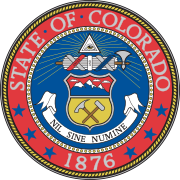A writ of prohibition is a writ directing a subordinate to stop doing something the law prohibits. In practice, the court directs the clerk to issue the writ, and directs the sheriff to serve it on the subordinate, and the clerk prepares the writ and gives it to the sheriff, who serves it. This writ is often issued by a superior court to the lower court asking it not to proceed with a case which does not fall under its jurisdiction.

Proposition 54 was a California ballot proposition on the October 7, 2003 gubernatorial recall election ballot. It failed to pass with 3,144,145 (36.1%) votes in favor and 5,541,314 (63.9%) against. It was placed on the ballot through the initiative process.
In the politics of the United States, the process of initiatives and referendums allow citizens of many U.S. states to place new legislation on a popular ballot, or to place legislation that has recently been passed by a legislature on a ballot for a popular vote. Initiatives and referendums, along with recall elections and popular primary elections, are signature reforms of the Progressive Era; they are written into several state constitutions, particularly in the West.

The California special election of 2005 was held on November 8, 2005 after being called by Governor Arnold Schwarzenegger on June 13, 2005.

The Colorado Supreme Court is the highest court in the U.S. state of Colorado. Located in Denver, the Court consists of a Chief Justice and six Associate Justices.

Amendment 41 is a citizen initiative adopted by Colorado voters in the 2006 general election. Amendment 41 has three main sections.

Ballot Measure 2 of 1998 is a ballot measure, since ruled unconstitutional, that added an amendment to the Alaska Constitution that prohibited the recognition of same-sex marriage in Alaska. The Ballot measure was sparked by the lawsuit filed by Jay Brause and Gene Dugan, after the two men were denied a marriage license by the Alaska Bureau of Vital Statistics. In Brause v. Bureau of Vital Statistics, 1998 WL 88743, the Alaska Superior Court ruled that the state needed compelling reason to deny marriage licenses to same-sex couples and ordered a trial on the question. In response, the Alaska Legislature immediately proposed and passed Resolution 42, which became what is now known as Ballot Measure 2. Ballot Measure 2 passed via public referendum on November 3, 1998, with 68% of voters supporting and 32% opposing. The Bause case was dismissed following the passage of the ballot measure.
Proposition 2 was a referendum for a state constitutional amendment placed on the ballot by the Texas legislature and approved by the voters at the November 8, 2005 general election. The measure added a new provision to the Texas Constitution, Article 1, Section 32, which provides that "Marriage in this state shall consist only of the union of one man and one woman", and "This state or a political subdivision of this state may not create or recognize any legal status identical or similar to marriage." Texas thus became the nineteenth US state to adopt constitutional amendment banning same-sex marriage. It was the most populous state to adopt a constitutional ban on same-sex marriage until California passed its ban in November 2008.

The Constitution of the State of Colorado is the foundation of the laws and government of the U.S. state of Colorado. The current, and only, Colorado State Constitution was drafted on March 14, 1876; approved by Colorado voters on July 1, 1876; and took effect upon the statehood of Colorado on August 1, 1876. From 1876 through 2007, the Colorado Constitution was amended 152 times. The Constitution of Colorado provides and derives its authority from the sovereignty of the people and is the foremost source of state law. In addition to providing for voting, the people of Colorado have reserved initiative of laws and referendum of laws enacted by the legislature to themselves and provided for recall of office holders.

Amendment 47 was a proposed initiative on the Colorado ballot for 2008. It was defeated.

Amendment 49 was a proposed initiative on the Colorado ballot for 2008. It was defeated.

Amendment 58 was a proposed initiative on the Colorado ballot of 2008 regarding Colorado's severance tax. It was turned down by 57.9% of the voters.
The South Dakota Open and Clean Government Act, or Initiated Measure 10, was a South Dakota initiative that would ban taxpayer-funded lobbying, stop the exchange of campaign donations for state contracts, and open a website with information on state contracts. The Open and Clean Government Act was proposed as a citizen-initiated state statute and appeared on the November 4, 2008 ballot.
The Nebraska Civil Rights Initiative, also known as Initiative 424, was a 2008 ballot measure that proposed a constitutional amendment which would prohibit the state from discriminating against, or granting preferential treatment to, "any individual or group on the basis of race, sex, color, ethnicity, or national origin in the operation of public employment, public education, or public contracting." The measure, in effect, banned affirmative action at the state level. It passed with 58% of the vote.

The California state elections was held on Election Day, November 6, 2012. On the ballot were eleven propositions, various parties' nominees for the United States presidency, the Class I Senator to the United States Senate, all of California's seats to the House of Representatives, all of the seats of the State Assembly, and all odd-numbered seats of the State Senate.

Colorado Amendment 62 was an initiated constitutional amendment that appeared on the November 2, 2010 ballot defining personhood as “every human being from the beginning of the biological development of that human being.” It sought to ban abortion in the state of Colorado and challenge Roe v. Wade.
Madsen v. Women's Health Center, Inc., 512 U.S. 753 (1994), is a United States Supreme Court case where Petitioners challenged the constitutionality of an injunction entered by a Florida state court which prohibits antiabortion protesters from demonstrating in certain places and in various ways outside of a health clinic that performs abortions.

Colorado Amendment 64 was a successful popular initiative ballot measure to amend the Constitution of the State of Colorado, outlining a statewide drug policy for cannabis. The measure passed on November 6, 2012, and along with a similar measure in Washington state, marked "an electoral first not only for America but for the world."

A ballot selfie is a type of selfie that is intended to depict the photographer's completed ballot in an election, as a way of showing how the photographer cast his or her vote. Despite their increasing use in democratic countries during the 2010s, they have been found to violate laws enacted in the late 19th and early 20th centuries to curtail vote buying, particularly in the United States. No voter has been prosecuted for taking a ballot selfie, however, and one U.S. federal appeals court has found that such laws are a violation of the U.S. Constitution's First Amendment guarantees of freedom of speech.









